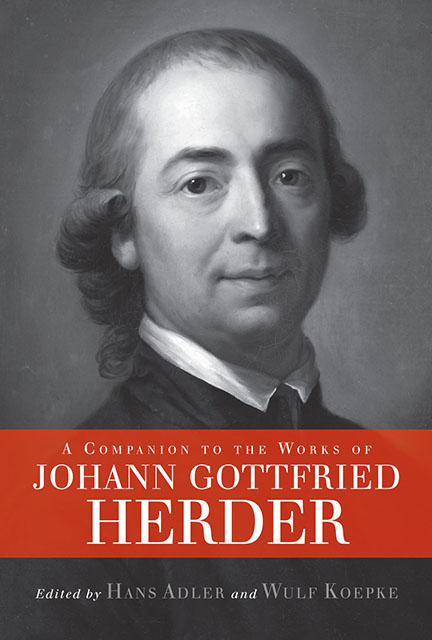Book contents
- Frontmatter
- Contents
- Acknowledgments
- List of Abbreviations
- Introduction
- 1 Herder's Life and Works
- 2 Herder's Epistemology
- 3 Herder and Historical Metanarrative: What's Philosophical about History?
- 4 Herder's Concept of Humanität
- 5 Herder and Language
- 6 Herder's Aesthetics and Poetics
- 7 Myth, Mythology, New Mythology
- 8 Particular Universals: Herder on National Literature, Popular Literature, and World Literature
- 9 Herder's Views on the Germans and Their Future Literature
- 10 Herder's Biblical Studies
- 11 Herder's Theology
- 12 Herder and Politics
- 13 Herder's Poetic Works, His Translations, and His Views on Poetry
- 14 Herder's Style
- 15 Herder as Critical Contemporary
- 16 Herder in Office: His Duties as Superintendent of Schools
- 17 Herder's Reception and Influence
- Bibliography
- Notes on the Contributors
- Index
8 - Particular Universals: Herder on National Literature, Popular Literature, and World Literature
Published online by Cambridge University Press: 28 February 2023
- Frontmatter
- Contents
- Acknowledgments
- List of Abbreviations
- Introduction
- 1 Herder's Life and Works
- 2 Herder's Epistemology
- 3 Herder and Historical Metanarrative: What's Philosophical about History?
- 4 Herder's Concept of Humanität
- 5 Herder and Language
- 6 Herder's Aesthetics and Poetics
- 7 Myth, Mythology, New Mythology
- 8 Particular Universals: Herder on National Literature, Popular Literature, and World Literature
- 9 Herder's Views on the Germans and Their Future Literature
- 10 Herder's Biblical Studies
- 11 Herder's Theology
- 12 Herder and Politics
- 13 Herder's Poetic Works, His Translations, and His Views on Poetry
- 14 Herder's Style
- 15 Herder as Critical Contemporary
- 16 Herder in Office: His Duties as Superintendent of Schools
- 17 Herder's Reception and Influence
- Bibliography
- Notes on the Contributors
- Index
Summary
A New Mythology
WHEN JOHANN GOTTFRIED HERDER at the age of twenty-two stepped onto the literary scene with his first major publication, the fragments Über die neuere deutsche Literatur (1766), he did so with a mixture of appropriate modesty and youthful self-assurance. His text, supposedly, was meant to be no more than a “supplement” to one of the most important critical projects of eighteenth-century Germany, that is, the Briefe, die neueste Literatur betreffend (1759–65), which were written and edited by such luminaries as Lessing, Mendelssohn, Nicolai, and Abbt, among others. The occasion for the composition of the Literaturbriefe was the Seven Years’ War (1756–63) in which a friend of Lessing’s, Ewald Christian von Kleist, had been severely wounded. The ensuing period of his hospitalization constituted the fictitious pretext for Lessing to start the Literaturbriefe, in response to his friend's request to alleviate the “boredom” of his recovery with news about the latest developments in the world of letters and sciences (SEW 93, 269–70). Herder had read all twenty-four parts of the Literaturbriefe in detail and considered his task to be that of a commentator; hence the constant references, quotations, and commentaries on the general themes of his source. Yet the thrust of his project turned out to be much more ambitious, as it would not present a mere narrative in the form of another collection of letters, but would aspire to a “pragmatic history in the republic of learning,” aiming to be “the voice of patriotic wisdom and the reformer of the people” (SEW 94). In other words, the text would address questions of national urgency in which modern literature would play a crucial part.
This early linkage between the nation and its aesthetic representation is central, as it motivates Herder's “dream” of a unique literary resurgence, which he posits against the reigning examples of classical and foreign contemporary literature. Measured against them, the country and its literary output are in disarray. “We are laboring in Germany as in the days of the confusion of Babel; divided by sects of taste, partisan in poetic art, schools of philosophy contesting one other: no capital and no common interest, no great and universal reformer and lawgiving genius” (SEW 95).
- Type
- Chapter
- Information
- A Companion to the Works of Johann Gottfried Herder , pp. 189 - 214Publisher: Boydell & BrewerPrint publication year: 2009
- 3
- Cited by



